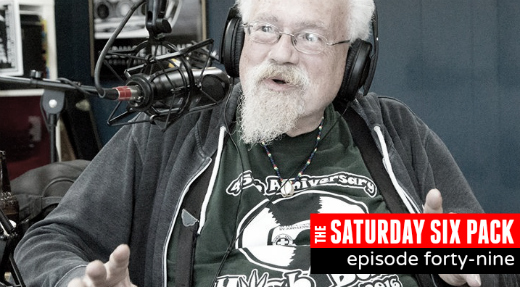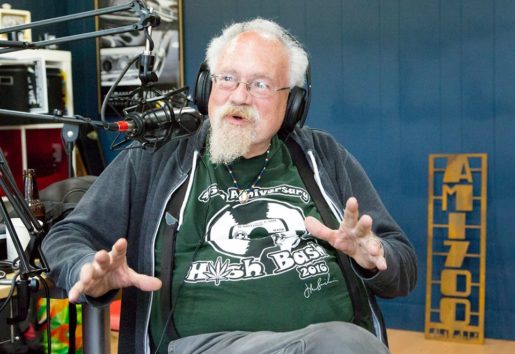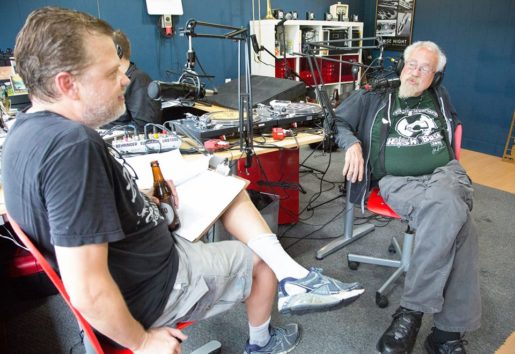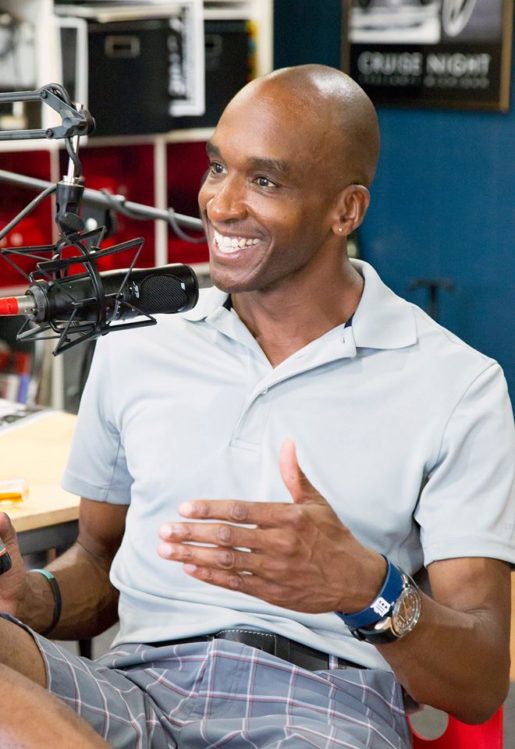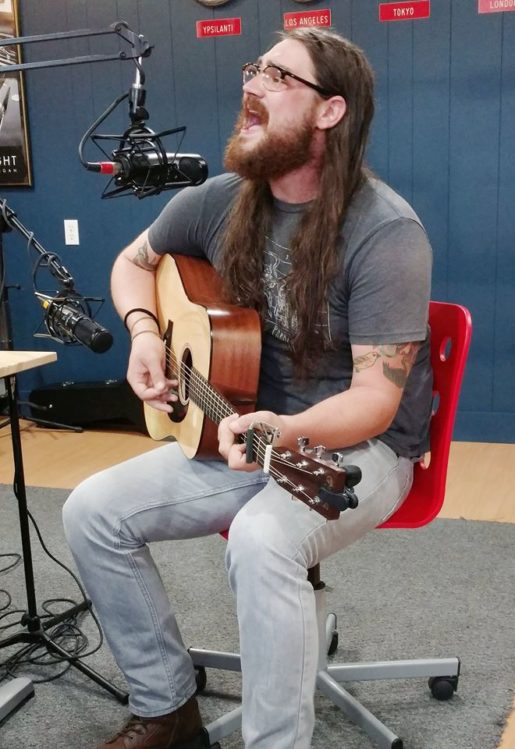The last episode of the Saturday Six Pack is now available online. If you’re so inclined, you can either scroll to the bottom of this post, where you’ll find the Soundcloud audio embedded, or just click over to iTunes, were you can download it in podcast form. I know it doesn’t mean much coming from me, but I’ve just listened to it, and it’s pretty damn good.
We started the show out with poet, activist John Sinclair, the co-founder of White Panther Party and former manager of the MC5, who my friends Chris Sandon and Patrick Elkins were nice enough to go and fetch for me from the parking lot of a McDonald’s just north of 8 Mile, between Ryan and Mound. Following are my rough notes on what was covered, along with photos taken by AM 1700 staff historian Kate De Fuccio… If you’re at all interested in local revolutionary history, though, you should really just listen… It’s pretty awesome stuff.
We started out talking about Sinclair’s early life, growing up in the small town of Davison, outside of Flint. We talked about his discovery of rhythm and blues music as a kid, and the years he spent as a greaser, hanging out at Whitey’s Drive-In, pumping quarters into the jukebox and listening to Chuck Berry perform Maybellene over, and over, and over again. [You’d get six plays for a quarter back then, he told us, and his friends and he would just keep playing Maybellene… When he first saw Berry perform live, he said, it was as though he’d “gone to heaven.”] Although he was just “a little white kid in Davison, Michigan,” he said, he was lucky in that he was “blessed” with exceptional parents, who, in his words, exhibited “superior humanity.” They were Eisenhower Republicans, he explained, but they weren’t racists, like so many at that time were. While they were conservative, he said, they believed in social justice. His rebellion, he said, was never against them. It was the system, Sinclair said, that he had an issue with. Sure, his parents would have preferred that he’d become a lawyer, he told us, but they came to appreciate what he was doing.
His parents, he said, came to understand why he’d chosen to revolt against the system the first time they came to see him in jail. It was ’64, and it was his fist time having been arrested for possession of marijuana. His parents had driven down from Davison to be at the arraignment, and that, he says, is when they came to appreciate just how terribly the American judicial system worked for the poor. He said it was like something out of Bleakhouse. If he’d tried to explain it to them, he said, they wouldn’t have believed it. But, when the saw this “web of ugliness (that we) weave around poor people,” he said, they got it. His parents, after that, according to Sinclair, were supportive of his journey.
Sinclair said he loved his dad, who worked for Buick in Flint. [Sinclair’s father wasn’t a union man, and didn’t work on the line. He had an office job at Buick, distributing their Opel line.] His dad, he said, not only used to drive him to shows in Flint when he was a music-obsessed kid, but once gave him $300 to feed the 30 hippies who lived with him as part of his Trans-Love Energies commune. [The fist show Sinclair’s dad drove him to was in ’55, when he was about 15. His father had driven him to Flint to see Bill Haley and His Comets and Frankie Lymon and the Teenagers.] His mom, who was a school teacher, he’d tell us later, even spoke on his behalf at the John Sinclair Freedom Rally in Ann Arbor in ’71, where thousands had gathered to demand that he be released from prison, where he’d already served two years of a ten year sentence for selling two joints. [He would be released from prison just a few days after the concert, which was headlined by John Lennon and Yoko Ono, as political pressure began to build in Lansing.]
The transition from greaser to hipster beatnik, he said, happened at Albion College, where he’d gone with the intention of “squaring up” and doing what was expected him. While he’d given up the greaser look, R & B was still close to his heart, though, and he’d brought his record collection with him. And, when the opportunity presented itself, he got a timeslot on the radio station that broadcast inside the boys’ dormitory, apparently attracting the attention of the lone campus beatnik, who made it a point to seek him out. No one at Albion, he said, knew about rhythm and blues, and the beatnik apparently got the sense that they might be kindred spirits. After skipping dinner to listen to records in Sinclair’s dorm room, the beatnik apparently asked, “Are you hip to jazz?” When Sinclair answered “no,” he was promptly dragged upstairs, where the young man put a copy of the Miles Davis record Dig on his turntable. “It was so smart, so intelligent,” Sinclair said. And the rest, as they say, is history. Sinclair jumped in with a passion, visiting record stores, reading liner notes, and listening to record after record. And, within a few years, he’d be writing for the jazz magazine Down Beat.
Having spent a good long while laying the foundation by talking about Chuck Berry and Miles Davis, we then got around to the MC5. Sinclair said that he hadn’t been interest in rock and roll, which he just saw it as “jive” teen music. That changed, however, with bands like the Mothers of Invention, who had started coming on the scene to challenge the status quo of the Beach Boys. Rock, he said, was beginning to open up and get political, and that interested him. And he saw a lot of the potential in the MC5, who were intent on using music to destroy the power structure. That idea, he says, wasn’t his, by the way. He wasn’t, he said, some kind of Svengali who had taken the MC5 and used them to accomplish his goals, as some have suggested. All of those ideas, he said, were first articulated by lead singer Rob Tyner. He agreed with them, he said, and helped to make them a reality, but he continued to reiterate throughout our conversation that it was really Tyner who had the grand vision. “Rob Tyner,” he said, “was a genius.”
At some point, our conversation turned toward Malcolm X, who Sinclair refers to as his “hero.” I’m not sure, but I believe, like Shaka Senghor, Sinclair may have first discovered the writings of Malcolm X in prison. The gateway, he said, was a book published in ’61 titled Black Muslims in America. This, according to Sinclair, led to his becoming one of the only white people in American not associated with either the FBI or the CIA, to subscribe to Muhammed Speaks, the newspaper published by Elijah Mohammed and the Nation of Islam. He said he appreciated the way they challenged the status quo, even pushing back against the idea of integration, urging black Americans to pull away from the white world. “Integration,” Sinclair said, “was always going to be a one way street.” And he didn’t want to see black culture destroyed.
And, of course, we discussed the founding of the anti-racist White Panther Party, which he founded in ’68 with Pun Plamondon and Leni Sinclair. [Leni Sinclair, by they way, will be joining me on episode 50 of the Saturday Six Pack next Saturday, as we continue to delve into the history of the White Panther Party.] I particularly liked our discussion about guns, and the internal debate within the White Panther party as to whether or not they should follow the lead of Huey P. Newton and the Black Panthers, and take up arms. Sinclair, while he wanted to toe the line set by the Panthers, said it didn’t make sense to him, as they could never have enough weapons to take on the police and the military. Sinclair, reflecting back on it, said “(I thought) we can’t win with guns.” They could, however, continue to chip away at the foundation of the power structure through other means. And that’s what he and his fellow revolutionaries attempted to do, by using music as “a weapon of cultural revolution,” owning their own printing presses, and creating independent institutions that they controlled, outside of the existing power structure…
And we discussed the circumstances surrounding the decision to move the Trans-Love commune from its home in Detroit to 1520 Hill Street in Ann Arbor. In the aftermath of the Detroit riots, he told us, things had become untenable for them in the city. They made their money playing shows, and running their store at the Grande Ballroom, Sinclair explained, and they just couldn’t exist under the curfew, which they thought might go on all summer. “We worked at night, and they were closing down the city at night,” Sinclair said. [This, by they way, is the point when Sinclair needed to borrow $300 from his father to buy food for the 30 or so “hippies and dope fiends” who were living communally in the building off the John Lodge Expressway, which they called “the castle.”] So, in May of ’68, just after Martin Luther King was assassinated, they moved to Ann Arbor. When asked why they’d chosen Ann Arbor, Sinclair responded that the city had 30,000 people and only 3 police cars. And, he added, the people who lived here were more liberal than the conservative factory workers they’d been having issues with in Detroit.
When they came from Detroit, Sinclair said, there were 35 of them. They had two bands [The MC5 and The Up], and printing presses. They were a force to be reckoned with. And the Ann Arbor Police Department sent a representative out to meet them. According to Sinclair, they told him that they’d moved to Ann Arbor to escape police harassment and they just wanted to be left alone to make music and do their own thing. “We’ll take care of ourselves,” they told the officer. And they did. In order to keep officers away from their events, where they feared that a police presence might terrify their fellow hippies, Sinclair and company created their own public safety force, which they called the Psychedelic Rangers. Given the vibe surrounding their events, Sinclair said, there wasn’t much for them to do. “Maybe somebody go too high, and they fell out into the sun,” and they had to be pulled into the shade, he said with a laugh, explaining the worst of what the Rangers had to deal with.
A listener wrote in with a comment at some point, saying that he’d recently been at an event at the old White Panther House, which is now a U-M co-op called Luther House, and he found it depressing. He couldn’t stop thinking, he said, about how complacent the people who live there are today, compared to how things had been in the late ‘60s. Sinclair responded by saying that U-M students had always been that way. Nothing has changed, he said. It wasn’t U-M students, according to Sinclair, who were going to their shows. It was high school students, dropouts and dope fiends who were going to their shows. The students at U-M, he said, were more likely to spit at them and make offensive comments about the length of their hair, or the fact that the women among them weren’t wearing bras. The students at U-M, he said, “didn’t get high,” and “didn’t like to fuck.” To put it simply, they were squares. [When they did put on events on the U-M campus, Sinclair said, it was never easy. The university would always decline their request, and Sinclair’s brother, an attorney, would have to file suit against them.]
Speaking of U-M students, I was surprised to hear from Sinclair that he had little to no interaction with Alan Haber, Tom Hayden, and other members of SDS, who were fighting for societal change on the U-M campus at the same time. With the exception of a few folks who left SDS to join Sinclair and his group, he said, there wasn’t really any dialogue. The SDS crew, he said, were all U-M students, whereas his folks were dropouts. “They were squares,” Sinclair said of the SDS students. He painted a picture of the SDS crew being young policy wonks, who wanted to change the system, whereas he thought all politics was “pig shit,” and wanted to bring the whole system crashing down. “We didn’t have any political aspirations,” he said. “We were hippies, we had no political interest, except for legalizing marijuana.” He went on to add, “We were prominent, and they could have found us.”
Oh, and he also said that he saw “anyone to the right of Malcolm X as totally lame.”
For what it’s worth, he still sees a lot of things as “totally lame.” A good deal of our discussion was spent taking about things that he has a strong dislike for, like Bruce Springsteen, The Eagles, people who call themselves hipsters, Ted Nugent, women who wear big white panties, rap music, the last MC5 record, etc… “I’m a hipster,” he says. “I’ve been one since ’62.” The people who we call hipsters today, he says, are really just yuppies… As for the Eagles, I don’t think It was their music so much that hated, but the fact that they represented the corporatization of rock and roll, and the fact that “the man” had found a way to coopt the revolution, which was begun by the likes of the MC5, taking it from the streets of America, and moving it into the boardroom. “They bought all of the guitars,” he said.
[While he hates most contemporary bands, Sinclair says he likes what Pussy Riot is doing in Russia. “I don’t care what they sound like,” he says. “I just like what they’re doing.” That, he said, is what rock and roll should be about.]
And we talked about the role he played in getting recording contracts for both the MC5 and Iggy and the Stooges… I told him about the recent exchange I had with Brendan Toller, the director of new documentary about Danny Fields, the man who signed the MC5 and the Stooges to Elektra, and what he’d told me about the impression that Sinclair and company had made on Fields. “Danny was taken aback by the energy and endless will of John Sinclair and the 5,” Toller said, “barking orders off the toilet, women serving men food, pounding on the tables like Vikings, printing presses. It was its own self-contained focused, politically-driven, hype machine years before bands did all their copy and publicity.” Sinclair confirmed it with a hearty laugh, and said that Fields was a mentor when it came to using the press in order to further one’s agenda. [Fields, as you’ll recall, has taken credit in the past for breaking up the Beatles, having been the one who first ran the story about John Lennon saying that they were “bigger than Jesus Christ,” leading to a series of protests across the American south, resulting in the band giving up touring.]
We talked about his breakup with the MC5 and what a rough year 1969 was… The year started out pretty good, he said, “(but then) I got fired and went to prison for two and a half years.” As for what instigated the break with the MC5, he said that they were tired of putting everything on the line for the revolution. They were constantly being attacked by people on the left, he said, and they wanted to withdraw. They just wanted to stop saying “yes” to everything. And, given that, Sinclair said, there wasn’t a need for him any longer, as he was the conduit to the revolution. [There was some anger, Sinclair said, over the fact that The Five were being paid $125 a night to play the Grande, and pull in a few thousand people, when other bands were being paid a lot more, and treated better. Sinclair didn’t say it quite like this, but it sounded like they were tired of being the house band for the revolution, expected to play for play everything they were asked to play, because they were down with the revolution.]
Sinclair, toward the end of our interview, summed up his revolutionary career with the following words. “Like an idiot,” he said, “I was trying to unite people to end the war and overthrow the government.” And the government, as you might expect, came after him and manufactured a reason to put him in prison. He was dangerous to the status quo. As he pointed out during our discussion, the CIA weren’t recognized as an entity within the United States when he and the White Panthers “started to hammer at them.” And that hammering, as some of you may know, culminated with the September 29, 1968 bombing of a CIA office in Ann Arbor, which Sinclair was initially suspected of, along with other members of the White Panther Party, but eventually cleared. When asked about the case, he said, “I wish I had done it, but I did not.” Eventually, a fellow they knew as President Dave, went to prison for not only that bombing, but several others. [Dave Valler had run for president in 1968. He lost.] But, regardless of whether he’d planted the half dozen or so sicks of dynamite on Main Street, it was clear to authorities that he was a leader in the movement, and he needed to be silenced.
We talked about a lot of other stuff too… like the founding of the Detroit Artist Workshop, his first meeting with Iggy Pop in Chicago, where the young Jim Osterberg had gone to learn how to play drums, and his memories of having eaten at the first Domino’s in Ypsilanti, which, he said, served horrible pizza, just like today. [Sinclair says he helped Iggy and his band, then called the Psychedelic Stooges, their first gigs.]
And, yes, he was high.
Then, at the 1:04 mark, we welcomed Dr. Benjamin Edmondson, the superintendent of Ypsilanti Community Schools, back into the studio to talk about the current state of our public school district. [Edmondson brought me an extra six pack, as he’d lost a bet with me a while back.] We talked about the challenges facing the district, like the fact that we have to pay some $2 million every year toward our debt, and just how much it’s set us back that Ypsi High’s new principal was just recently sentenced in a Detroit corruption probe, stemming from kickbacks she’d accepted before taking the job here. Despite all of this, though, our conversation was relatively positive. The superintendent and I discussed ideas as to how we might repurpose the decommissioned schools in the district, turning them into things like resource centers for local families, and the fact that there seems to be new, positive energy surrounding the schools we’ve been able to retain, despite the state policies that pit neighboring districts against one another and allow for an endless number of unregulated charter schools that can spent more on marketing than on education. And we talked about the untimely passing of WIMA student Xavier Small, and how his death has brought that school closer together… We ended with Edmondson imploring parents to “be a part of the solution” and return to the district. “Invest in your home town,” he told parents in the audience who send their children elsewhere for school… Then going one step further, he added, “or move.”
And, at the 1:41 mark, we invited Plymouth-based singer/songwriter Cash Harrison/a> into the studio to shoot the shit and play a few songs for us. Among other things, we discussed heartache, and the fact that his real name isn’t Cash. “I’ve dated people that don’t know my real name,” he told us, explaining that changing is name was a “power move” on his part… It’s good, beautiful stuff… You should listen.
Thanks, as always, to AM 1700 for hosting the show and station owner Brian Robb for running the board, making sure the bills paid, and insuring that the toilet paper and bleach stays stocked.
If you like this episode, check out our archive of past shows at iTunes. And do please leave a review if you have the time, OK? It’s nice to know that people are listening, and, unless you call in, that’s pretty much the only way we know.
Now, if you haven’t already, please listen for yourself, and experience the magic firsthand.
[Episode 49 of the Saturday Six Pack was recorded live on August 20, 2016, in historic downtown Ypsilanti, Michigan, in the studies of AM1700 Radio.]
